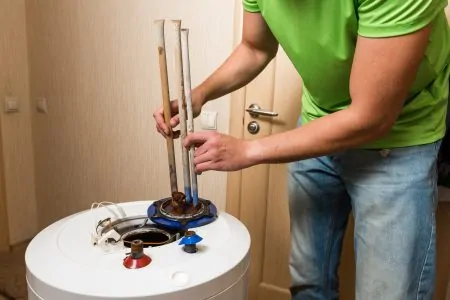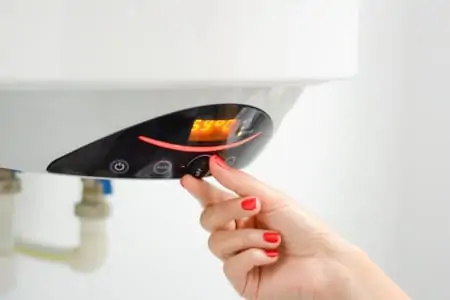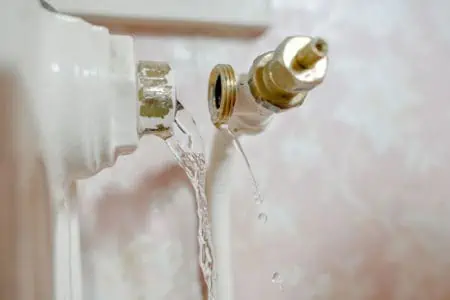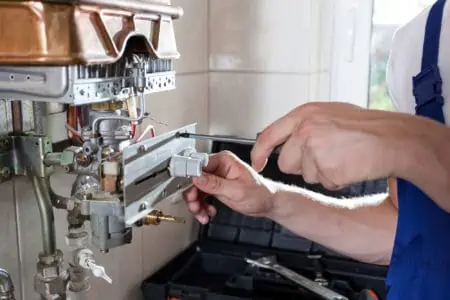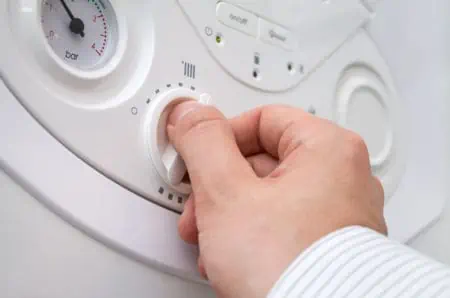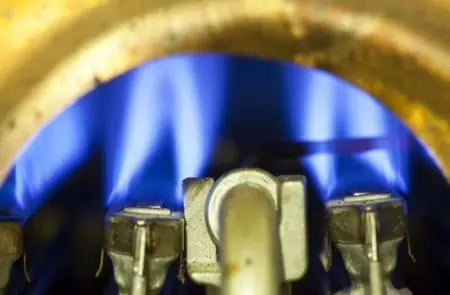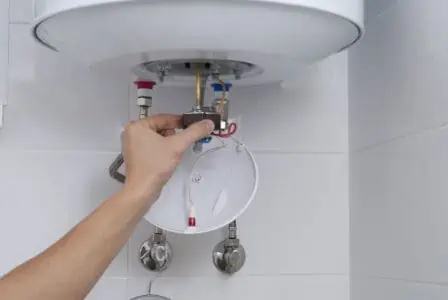Have you recently noticed an unpleasant odor coming from your hot water? To be more specific, your hot water smells like rotten eggs. This issue is surprisingly common in homes that get their water from wells, but it can also be caused by your water heater.
If your hot water stinks, there are several possible reasons for this very unfortunate smell. With modern heating systems being so complex, it can be difficult to know where to start searching for the origin of the issue.
In this article, we will explain why your water smells like rotten eggs and how you can overcome this pungent problem.
Key Takeaways
- Hot water smells like rotten eggs due to hydrogen sulfide gas or sulfur bacteria in the water heater.
- Check the anode rod in your water heater and replace it if corroded or worn out.
- Flush your water heater tank with hydrogen peroxide to get rid of sulfur bacteria and the smell.
- Regularly inspect the anode rod and flush the tank to prevent the rotten egg smell from returning.
What Causes a Rotten Egg Smell in Hot Water?
Areas with soft water often experience a rotten egg smell, which is present in both cold and hot water. However, if you notice the odor specifically when the hot water is on, the problem is likely being caused by your water heater.
Softened water will often contain traces of hydrogen sulfide gas. A water heater tank is an ideal environment for sulfate to convert to hydrogen sulfide gas. The tank is a warm enclosed space where sulfur bacteria can thrive.
When the sulfur smell in water is released, it is very similar to rotten eggs. A rotten egg smell is also more likely to occur in a water system supplied by a well.
Sulfur Bacteria
Sulfur bacteria naturally occur in our water supply. When the amount of bacteria increases, they settle and breed within your water heater.
This causes an increase in hydrogen sulfide gas and eventually creates a familiar unpleasant smell. If your hot water heater smells like sulfur, to get rid of the smell, you first need to get rid of the bacteria.
Anode Rod
The anode rod is one of the most important parts of your water heater. It draws any corrosive materials inside the tank to itself, effectively preventing your tank from rusting.
As the anode rod prevents the tank from rusting, it essentially sacrifices itself and corrodes instead. This is why they are sometimes called “sacrificial rods”. This can cause a reaction between the sulfate in the water and the rod, which creates a very unpleasant smell.
It is important to check the anode rod and replace it whenever necessary. Some units have two anode rods, which will make the water heater anode rod smell even worse.
Is Rotten Egg Smelling Water Harmful?
When you first notice a rotten egg smell, you might be concerned that the water is unclean or dangerous. In truth, the unpleasant odor has nothing to do with the quality of your water itself.
Unfortunately, hydrogen sulfide is highly corrosive to metal and can damage your pipes. It can also create black stains on silverware and plumbing.
Worse, if high levels of hydrogen sulfide gas are released into the air, it can be a major health hazard. If this happens, it’s critical that the gas is neutralized, especially in an enclosed space such as a basement. It’s best to call in a qualified professional to tackle this.
Sulfur bacteria alone isn’t harmful but it can cause damage to a water heater. It produces a thick slime that promotes the growth of other bacteria, such as iron bacteria. This slime can clog pipes and plumbing.
The slime can be white, black, grey, or even reddish-brown if it contains iron bacteria (1).
How to Get Rid of Rotten Egg Smell
Before you can fix the problem, you need to find its source. Give your water heater a thorough check — if the anode rod is corroded or worn out, it should be replaced. However, if the anode rod is still in good condition, you can be sure there is a significant amount of sulfur bacteria.
1. Diagnosing the Anode Rod
The average anode rod might last up to six years. However, many are completely corroded by four or five years — it all depends on the water quality and heater maintenance. It’s recommended to inspect the anode rod after three to four years (2). Remember that the anode rod is a “sacrificial” component and designed to corrode away at some point.
Before checking the anode rod, turn off the power to your unit. If you have an electric heater, shut the power off at the circuit breaker. If you have a gas-powered unit, you can turn the control valve to “vacation” mode.
Keep In Mind
Turn off the cold water valve and attach a garden hose to the drain valve at the bottom of the tank.
Before Draining
Open the drain valve and empty the water into a bucket or nearby drain. You don’t necessarily need to drain the entire tank; it depends on where your anode rod is located. Some are attached to the top while others are on the side of the tank — look for a hexagonal plug.
After draining the tank to your desired level, you can close the drain valve. Be careful when removing the hose; we suggest you wait until it has cooled before handling it.
Before you can remove the anode rod, open a nearby hot water faucet. This will relieve the pressure and allow you to remove it safely.
Use a socket wrench to loosen the rod. You may need to tap the top gently to loosen it. If the rod is too thick to remove, it is still healthy and you can leave it.
2. Types of Material
After removing the anode rod, you have the option of replacing it with a different material. Anode rods are made of metal, which corrodes instead of your tank. Choosing the right material can help prevent a bad odor.
Aluminum
Aluminum rods are the most common type and they corrode the slowest. If you often notice a rotten egg smell, an aluminum rod is the best choice.
Magnesium
Magnesium anode rods are the most effective. They corrode rather quickly but this is a sign that the rod is working and the tank is healthy (3).
The dissolved magnesium also provides several health benefits (4). If you only experience a rotten egg smell on occasion, a magnesium rod is the best option.
Zinc
Zinc is naturally antifungal and will help maintain a healthy balance within the tank. Zinc rods are a good choice if your hot water often smells like rotten eggs.
3. Types of Anode Rods
There are several types of anode rods you can choose, these include:
- Flexible anode rods: These are similar to regular rods, except they can bend. The flexible structure makes it easier to fit them into tight spaces.
- Powered anode rods: These anode rods are the newest type. They emit electrical pulses that improve the anti-corrosive effectiveness of the rod.
Adding Hydrogen Peroxide to Your Water Heater
If the rotten egg smell isn’t due to a corroded anode rod, it’s likely caused by sulfur bacteria. Flushing your tank with hydrogen peroxide can quickly get rid of the smell and restore a healthy balance inside your tank. The substance is an effective water heater odor killer.
1. Shut the Power Off
As always, before you start any work on your water heater, the power should be off. Here, you will also need to turn off a gas-powered unit completely as it will be drained. You should also close the main gas shut-off valve.
2. Open a Nearby Tap
You should open a nearby hot water tap as well as the TPR valve. This is a safety valve that releases some water if the pressure becomes too high within the tank.
Begin draining the tank but stop once the water reaches the level of the TPR valve. Then, shut off both the tap and TPR valve.
3. Add Hydrogen Peroxide
Add 3% hydrogen peroxide — about one to two quarts per 40 gallons. After adding the hydrogen peroxide, turn on the cold water inlet valve and allow the tank to fill. Once it’s filled, leave it for a couple of hours.
4. Flush the Tank
After the tank has been sitting for a couple of hours, turn on the cold water inlet valve and a hot tap nearby. This will flush the water through your tank and pipes.
After flushing, allow the tank to fill. You can check the water to see if it’s cloudy or still has an odor present. If it has, you should repeat the process.
You might notice the faucet sputtering — this is only the air leaving the tank. Let the tap run until the flow is normal and the air will eventually dissipate. Once you’re done, turn the power back on.
Can It Be Prevented?
Whether or not a rotten egg smell can be prevented depends on your local water quality. As mentioned earlier, softened water often plays a part in producing a bad odor. To prevent any smell, check the anode rod regularly and replace it if needed.
Flushing your tank with hydrogen peroxide regularly can also remove any bacteria before they begin to stink. This is also a good way to get rid of any sediment or buildup.
FAQs
In Summary
If your hot water suddenly smells like rotten eggs, it’s easy to assume the worst. Before you run out to buy bottled water, it’s best to simply check your water heater. You now know how to get rid of a rotten egg smell in your water.
Two common problems could cause an unpleasant odor in your hot water: sulfur bacteria or a badly corroded anode rod. Both these issues are easy to fix — either replace the anode rod or flush the tank using hydrogen peroxide.
